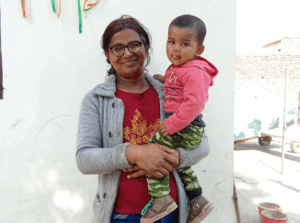Inspiration
3 Exceptional Stories of TED Speakers With Special Needs
Three inspiring Ted Talks from people who despite being specially-abled, kept up with their dreams and found new ways to move ahead in life.
Published
5 years agoon
By
Rahul Sharma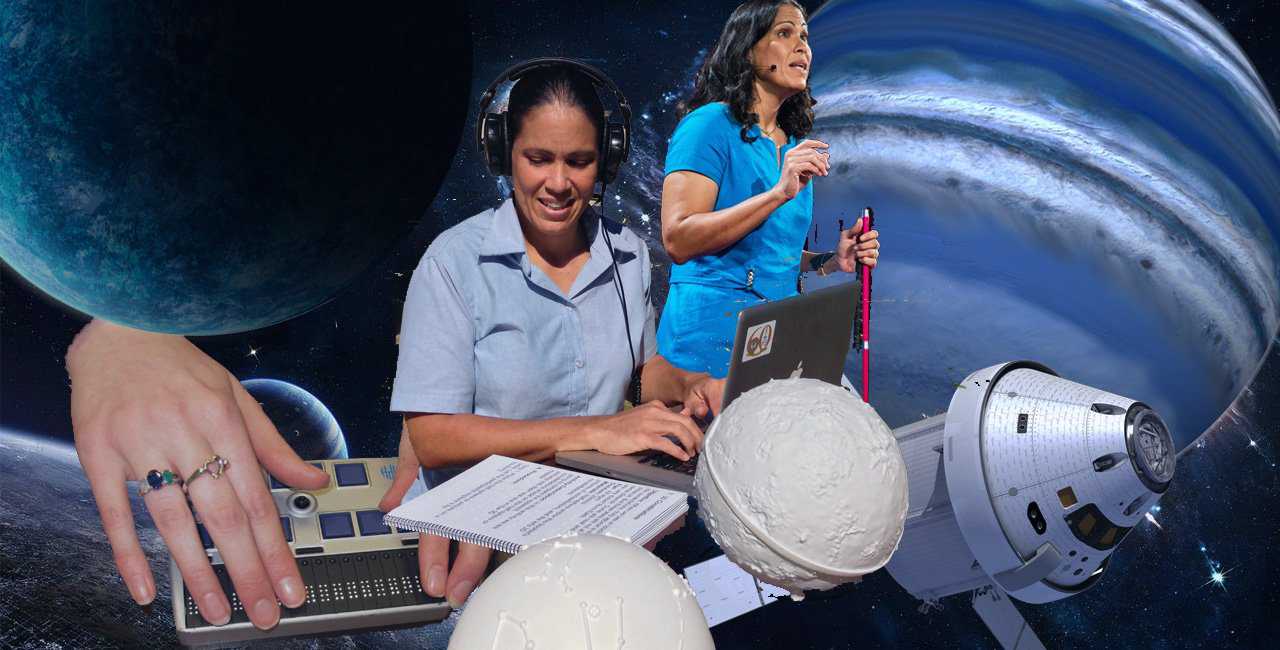
Disabilities can cause someone to lose hope in the midst of this chaotic world, where the competition among the ones who have been blessed with natural abilities is also heartless. To achieve one’s dream with limited capabilities is not an easy job and yet we see how specially-abled people make it to the world stage by the sheer force of their will. These inspiring stories tell us how practising Inclusion in schools and workplaces can give people with special needs a chance to prove their calibre and add slur to society.
ScooNews, after listening to many such Ted Talks by people with special needs, brings to you the story of three individuals, who did not let their dreams checked by their disabilities.
ROSIE KING – Writer, Public Speaker

Rosie King is a young autistic woman, who talks about her condition and how she turned it into an asset.
She lays stress on the stereotypes forced upon autistic people on how they are associated with math and science and hardly with creative work. She talks about her brother who is autistic and non-verbal but on the other hand, how she loves to talk even being autistic.
Rosie also enlightens the viewers about how Autism enhances her imagination and she finds it as an ability rather than a disability. As a child, she found it hard to keep up with the lessons in her schools as she would find it boring and will escape to a parallel imaginative world. She shares how she had a hard time at school because of her condition and how her imagination sometimes affected her behavior.
The stigma of being autistic also made her classmates maintain a distance and yet she found the real ones who truly cared for her.
She questions the definition of normal and says that being normal was never a compliment and being different is being unique and extraordinary.
In the talk, Rosie shares her achievements about how even after being Autistic, she has presented documentaries to the BBC that she is in the middle of writing a book, she talking to a large audience at TED and how she found a way to communicate with her siblings.
She ends the talk by asking a question to the audience, “If we can get inside the person’s mind, Autistic or normal, instead of punishing anything that strives from normal, why not celebrate uniqueness and cheer every time someone unleashes their imagination”.
Watch the full video here: https://www.youtube.com/watch?v=jQ95xlZeHo8&t=9s
WANDA DIAZ-MERCED – Astronomer

Wanda Diaz-Merced is one of the most prominent Astronomers working in the field. Astronomy is a common scientific discipline with a lot of people around the globe engage in it. What sets Wanda apart from other colleagues is that she is blind.
In her inspiring TED Talks, she reveals how she lost her sight due to a prolonged illness at the very beginning of her career and it disabled her to witness the wonders of celestial events through dedicated Gamma-Ray Light Curve to interpret the changes in light intensity.
She yearned to work again in the field and soon found out the way to do so by converting the light curve into a sound.
Her disability did not stop her from following her passion as she could do with sound, what her colleagues were doing visually.
A special thanks was bestowed upon the government of South Africa for the support that she received from them.
Wanda believes that access to information is everybody’s right and that disabilities should not stand as a roadblock for anyone who wishes to make a change. She remarks, “Information access empowers us to flourish. It gives us equal opportunity to display our talents and choose what we want to do with our lives based on interest and not potential barriers.”
Wanda has been working since then to make her scientific career a possibility for fellow differently-abled people. “I think that science is for everyone, it belongs to the people and it has to be available to everyone because we are all-natural explorers,” says Wanda
You can watch the full video here: https://www.youtube.com/watch?v=-hY9QSdaReY
PHIL HANSEN – Artist

In this unique Ted Talk, Phil Hansen takes you through his journey of artistic endeavors. While in an art school, he was diagnosed with a neurological issue that made his hands shake continuously.
He left the art school post-detection and gave up his hope of being an artist only to come back after three years. His doctor advised him to adopt his disability and he did so by adapting his art to suit his ability.
In the process of embracing his limitation, he became limitless and started creating art through unconventional methods. He shares how, after getting a job, he brought himself art supplies that he could not afford earlier which ultimately created options for him he was not ready to explore until then.
In order to enhance his creativity again, he turned to limited supplies to do more by using less. The story of Phil Hansen is a philosophical journey of an artist that he lived in reality.
His concept of creating art through limitations was the turning point of his life and is enough to inspire anyone who faces such physical restrictions.
“Looking at the limitations, as a source of creativity changed the course of my life,” says Phil Hansen.
You can watch the full video here: https://www.youtube.com/watch?v=YrZTho_o_is&t=24s
Image courtesy: remezcla.com
You may like
-


Less Than Half of Indian Schools Offer Skill-Based Courses for Senior Students: NCERT Survey
-
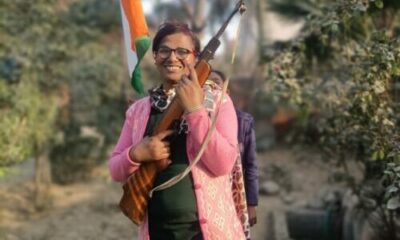

The Woman Who Refused to Disappear – Aditi Sharma’s Quiet Fight for Education
-
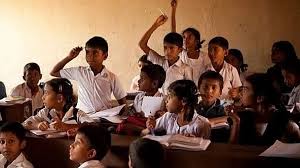

UP Govt Launches Astro Labs in Government Schools to Boost Scientific Learning
-
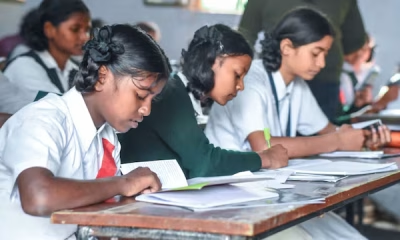

Class 3 Learning Levels Show Gains Since Pandemic, But Still Below 2017: PARAKH Survey
-
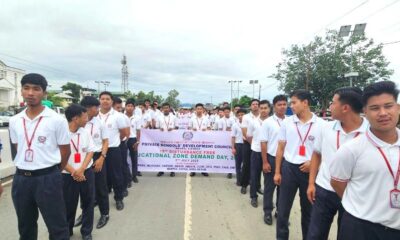

Manipur Rallies Call for Disruption-Free Education Amid Ongoing Unrest
-
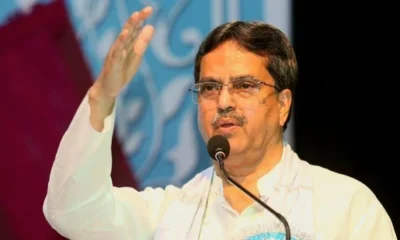

Tripura CM Launches School Framework, Stresses Social Work in Education
-
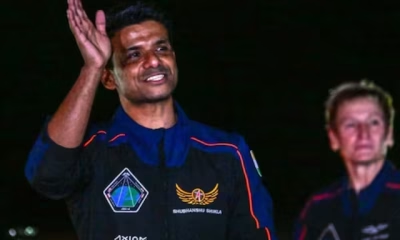

“We Sleep on Walls Here”: Shubhanshu Shukla Talks to Indian Students from Space
-


A Structural Proposal to Transform School Education in Bihar
-
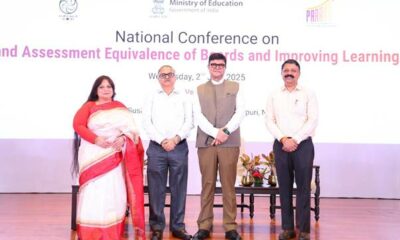

National Conference Pushes for Common Standards Across School Boards
-
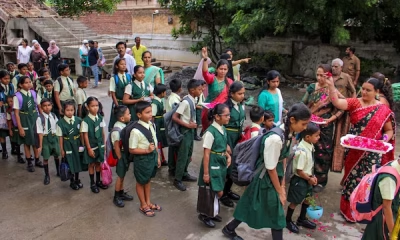

Maharashtra: Over 8,000 Villages Lack Schools, CCTV Compliance Still Patchy
Education
The Woman Who Refused to Disappear – Aditi Sharma’s Quiet Fight for Education
Published
17 hours agoon
July 10, 2025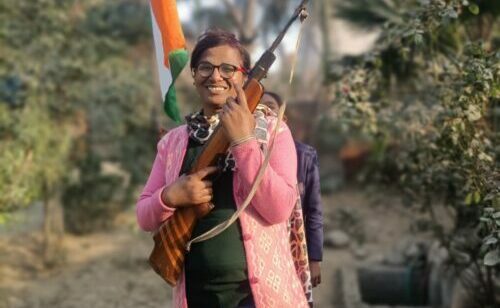
In a quiet corner of Karnal, Haryana, Aditi Sharma runs a small school for underprivileged children. She is the founder, principal, and often, the only teacher. As a transgender woman in North India, her journey has been marked by resistance and isolation — but also by unwavering commitment. Her school may lack formal recognition or resources, but it stands as a space of learning, inclusion, and quiet resilience.
Aditi is not just the founder and principal of Haryana Public School. She is also a transgender woman who dared to imagine a different kind of North India — one where prejudice makes way for possibility, and education belongs to everyone.
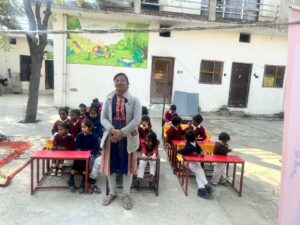
But dreams, she learned early on, come at a cost.
Born and raised in Delhi, Aditi was no stranger to the stereotypes that shadow the transgender community.
“Even educated people carry the assumption that all trans people beg or perform ceremonial rituals. That’s the stereotype I grew up seeing around me,” she says.
It disturbed her and lit the fuse of quiet rebellion.
Leaving Delhi behind, she moved to Karnal with one goal: to build a school not just for visibility, but for children who had nowhere else to go. Her father, unaware she had come out, gave her a 1,200-square-yard plot to build on. “At the time, I hadn’t fully come out. Had they known I was transgender, they wouldn’t have named it to me.”
What she built wasn’t just a school — it was a statement.
In the beginning, there were no teachers, no steady funds, and no blueprint. “I doubted whether I could run a school at all. I had no confidence. But slowly, a few children started coming in. Then a few more. At one point, we had 60–70 students.”
That number dropped, not due to a lack of dedication, but constant harassment. Neighbours let their dogs loose outside. Parents were warned, “Why send your child there? This isn’t a real school.” Some believed her identity disqualified her from leadership, from teaching, from existing with dignity.
She persisted anyway.
Aditi never set out to run a school for underprivileged children. It wasn’t a strategic choice or a targeted mission. It was simply what remained when everyone else walked away. Families who could afford higher fees refused to send their children to a school run by a transgender woman. Teachers quit under social pressure. So she opened her doors to those who had nowhere else to go — children whose families could pay ₹100 a month, sometimes just ₹50, and often nothing at all. “If they don’t learn here, they won’t learn anywhere,” she says. And so she teaches — not because it’s easy, but because no one else will.
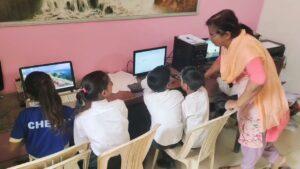
Her day begins at 4 AM — cleaning, prepping, sourcing supplies. By 8 AM, she’s teaching English, guiding students through computing tasks, or painting with them on borrowed desktops. She buys second-hand books herself. There are no permanent staff members. Most teachers leave within weeks. “They say, ‘My family doesn’t want me working here.’ The social pressure is immense.”
Once, a neighbour handed her a one-day-old baby and walked away. Aditi cared for her. When the child fell ill, she spent 12 days at the hospital with her — and the other children. Alone. “They don’t speak to me anymore,” she says of her family. “I’ve learned to let go. If someone doesn’t want to stay in touch, that’s okay. You still have to be happy.”
Haryana Public School is still not recognised by the state government. Despite its large plot, authorities claim she doesn’t meet the criteria. “Other schools on smaller land get recognised,” she says. “But because I’m transgender, they say no.” Her case is currently being reviewed by the Human Rights Commission. Justice Lalit Batra, in a hearing, reportedly said:
“If she doesn’t meet your current rule, change the rule.”
Meanwhile, the children continue to learn — with donated books, basic tools, and the irrepressible will of one woman. Aditi has even built two giant model airplanes — one stretching 20 feet — from scrap and wood. “They don’t fly, but they spark curiosity. Ten children can sit inside. It makes them dream.”
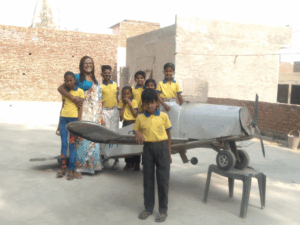
And dreams are something she insists on, even when the world offers no applause. “One child had developmental issues. No school would take him. People told me I was wasting my time. But he deserved a chance.”
Sometimes, appreciation is scarce. Respect even more so. “When parents don’t respect you, neither do their children,” she admits. “When your own life is a constant struggle, it becomes hard to build emotional bonds.”
But she still shows up every day. Reporters ask why so many people visit her school. “Because we’re doing something that shakes the norms,” she tells the children. “This school is special.”
And they believe her. Because children don’t discriminate. Adults do.
Her message to the transgender community is clear:
“Don’t wait for society to accept you. Build your own path. Even if you’re the only one walking it.”
Aditi Sharma may be the only openly transgender woman in North India running a school. But she’s not asking for sympathy. Just space. Just dignity. Just the right to show up — and not disappear.
“Even if only one child comes,” she says,
“I’ll keep the doors open.”
Read the full story in our latest Teacher Warriors issue: https://scoonews.com/magazines/scoonews-june-july-2025-digital-edition/
Education
A Vision Beyond Sight – How Aarti Takawane is Rewriting Futures for Blind Girls
Published
2 days agoon
July 9, 2025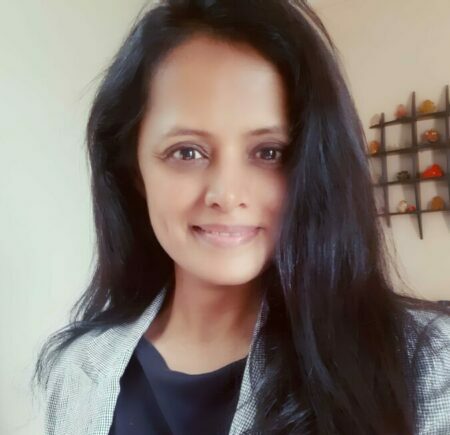
Sometimes, the most extraordinary journeys begin with an ordinary restlessness — that nagging sense that comfort isn’t enough. For Aarti Takawane, that quiet realisation led her to walk away from a secure corporate job, and towards a mission she never imagined for herself.
Aarti’s early career looked like everything most people might aspire to: a steady job, good salary, and the kind of stability that makes parents proud. But deep down, she felt a pull that numbers and meetings just couldn’t satisfy. With a background in psychology and a genuine desire to help others, she always knew her purpose lay in people, not just profit.
That spark turned into a flame when she met Mrs Meera Badve, founder of Niwant, an organisation supporting blind students in higher education. A casual encounter at a social event became a life-changing conversation. Aarti took a leap of faith and began volunteering at Niwant — and for the first time, she felt what it was like to make an impact where it truly mattered.
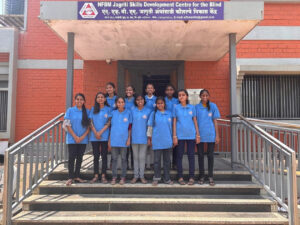
Her path eventually led her to the National Federation of the Blind’s Jagriti School for Blind Girls in Pune — a place that today houses 110 blind girls, 99% of whom come from rural areas. Here, the girls don’t just study; they live, learn, and grow together in an environment that believes in what they can do, rather than what they can’t.
When Aarti joined Jagriti, she began as a psychologist, focusing on the social and emotional development of the girls. But the more she listened to their dreams and struggles, the more she saw the barriers waiting for them after school. “When you give them the right tools, you’re not just giving them a skill — you’re giving them back their choice,” she reflects.
Visually-challenged girls face a stark reality once they step out into the world. Apart from limited government quota jobs in banks or insurance, there were few opportunities that truly matched their abilities. So, Aarti decided to do something about it.
“True empowerment means they can live with dignity, not just survive.”
She founded the Skill Development Centre inside Jagriti School — a space where blind girls could learn practical, job-ready skills that tap into their real strengths. Many of the students have remarkable listening and verbal abilities. So the Centre offers courses that play to these strengths: voice modulation, foreign languages, recruitment training, and more. There are also classes in computer literacy, digital accessibility testing, and even coaching for competitive exams.
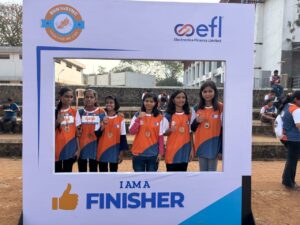
But the real magic lies in how the Centre stays rooted in reality. The team works closely with organisations like Vision-Aid India and inclusive employers to keep training aligned with what the industry actually wants. Each student’s strengths and interests are mapped out with care, so the training feels personal and purposeful.
Equally important is what happens beyond the classroom. Many girls arrive at Jagriti shy, anxious, or unsure of themselves. They may have never used a screen reader, travelled alone, or spoken up in public. So the Centre pairs technical skills with confidence-building: mobility training, decision-making workshops, life skills, and emotional support.
“They didn’t need sympathy — they needed direction, support and opportunity,”
Funding is always a tightrope act — a mix of donations, CSR partnerships, and the occasional government grant keeps the Centre alive. It covers trainer salaries, hostel facilities, assistive technology, and learning materials. The school is committed to full transparency with its supporters, many of whom return year after year because they can see exactly where their help is going.

Aarti knows that none of this would be possible without the right people leading the way. Every teacher or trainer goes through orientation in assistive technology and inclusive education. Sensitisation workshops and regular feedback from students make sure the environment stays supportive and respectful.
As the world changes, so do Aarti’s dreams for the Centre. She hopes to introduce advanced digital modules, remote work training, and a stronger network of inclusive employers. But what excites her most is the chance to rewrite how society sees disability, not as a barrier, but as a different kind of potential waiting to be unlocked.
For the 110 girls who call Jagriti School home, Aarti Takawane is more than just a teacher. She’s proof that sometimes, the best things really do happen by accident — and that true vision is not about what we see, but what we choose to do about what we can’t.
Read the full story in our issue of Teacher Warriors 2025 at https://scoonews.com/magazines/scoonews-june-july-2025-digital-edition/
Education
“We Sleep on Walls Here”: Shubhanshu Shukla Talks to Indian Students from Space
Published
6 days agoon
July 4, 2025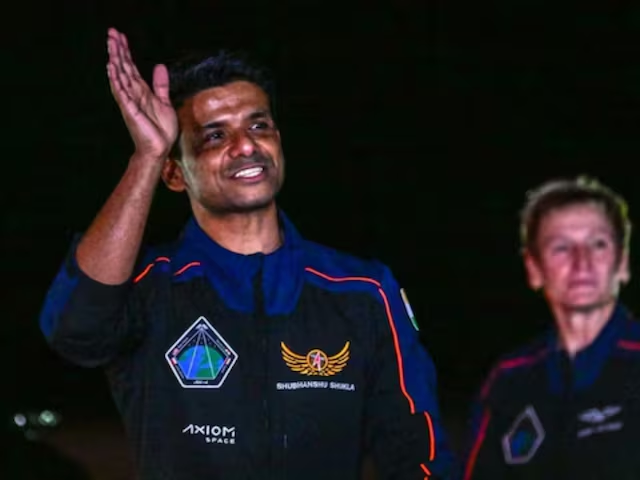
Astronaut Shubhanshu Shukla, currently stationed aboard the International Space Station (ISS), answered questions from schoolchildren during a live interaction hosted under ISRO’s Vidyarthi Samvad Program.
The session, designed to bring students closer to the realities of space science, turned into a heartwarming and humorous conversation about food, sleep, and the sheer wonder of viewing Earth from space.
When asked how astronauts sleep in zero gravity, Shukla smiled and explained: “There is no floor or ceiling in space. Some of us sleep on the wall, some on the ceiling. We have to tie ourselves down so we don’t float away while sleeping.”
The conversation became sweeter when Shukla revealed that he brought familiar Indian flavours with him into orbit. “I have carried gajar ka halwa, moong dal halwa, and mango juice with me from India,” he said, to the delight of the young audience. He clarified that the halwa was specially medicated for space missions, not made at home — a detail that sparked laughter and curiosity alike.
The astronaut also spoke about daily life aboard the ISS, including how exercise is essential to counter microgravity. “We ride bicycles here, but there are no seats. We strap ourselves in with belts,” he told the children, who were both fascinated and amused by the image.
For Shukla, however, the highlight of being in space remains the view of Earth. “That blue sphere, that light mist… seeing Earth from here is the most beautiful experience. It’s hard to describe in words.”
Addressing mental well-being, he shared how astronauts stay connected with their families. “Technology helps bridge the distance. We can talk to our loved ones, and that keeps us grounded — even when we’re not.”
Also present during the interaction was Group Captain Angad Pratap, a fellow member of the Gaganyaan mission crew, who encouraged students to consider careers in aviation and space science.
For many students, the session was a dream come true. “It felt like science fiction,” said one participant. “Now I believe I can go to space one day.”
As India continues its rapid progress in space exploration, conversations like these serve as reminders that inspiration is as critical as infrastructure — and that sometimes, a simple chat with an astronaut can launch the imagination of an entire generation.
Education
Banu Mushtaq’s International Booker Win Is a Wake-Up Call for Indian Schools to Reclaim Literature
Published
2 months agoon
May 22, 2025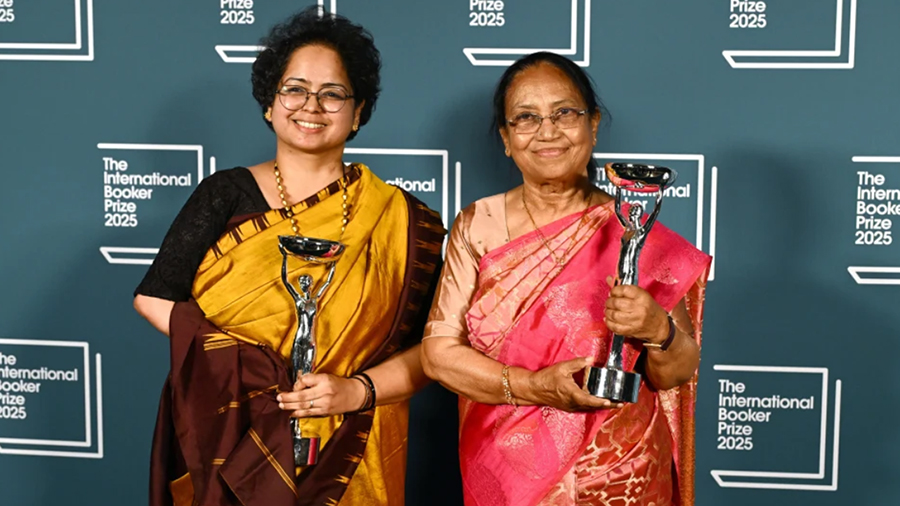
When Banu Mushtaq became the first Kannada author to win the prestigious International Booker Prize for her short story collection Heart Lamp, she didn’t just make literary history—she reignited a conversation about the role of literature in shaping society, and the way schools can nurture future writers not just as hobbyists, but as cultural forces.
Mushtaq, along with translator Deepa Bhasthi, was honoured for Heart Lamp, a collection of stories chronicling the lives of Muslim women in Karnataka across three decades. The stories are rooted in resistance, critique of religious and patriarchal structures, and everyday courage. The recognition was not just for the literary craft, but for the emotional and moral clarity the stories offer—a kind of truth that is rarely rewarded in global spaces. But the International Booker did just that.
And yet, how many students in Indian classrooms today know what the Booker Prize even is? While the Grammys, Oscars and even YouTube Play Buttons are common cultural currency among young people, literary awards often pass under the radar. This needs to change.
The International Booker Prize is one of the most prestigious literary honours in the world, recognising the finest works of fiction translated into English. It opens up space for voices that often remain local to reach a global stage. For students in India, this is an opportunity to understand that writing, especially in regional languages, is not a dead-end path. Yes, it may not offer the instant gratification of a viral video or influencer deal—but as Mushtaq’s life proves, it can shape public discourse, win global accolades, and leave behind a legacy that matters.
For educators, this is a teaching moment. Banu Mushtaq’s story is as much about literary merit as it is about resilience. She wrote in Kannada, a language she adopted over her native Urdu. She survived deep personal trauma, including a suicide attempt, and faced social backlash for her activism. She was a councillor, a journalist, and a lifelong advocate for women’s rights. These are the kinds of role models classrooms should be spotlighting—especially for young girls who need to see that stories, quite literally, can change lives.
Heart Lamp may not be appropriate for every age group, but its themes—identity, voice, justice—can be introduced in many ways. Schools should consider book discussions, literary circles, or even creative writing prompts inspired by such works to encourage students to find their voice, in whatever language or form it may come.
This win is also a reminder that educators need to broaden the definition of success they present to students. STEM, coding, and commerce continue to dominate career conversations, but it’s equally crucial to show that the arts—especially literature—have their own path to impact and influence. We hope for a time when young writers are not asked “what else do you do?” but are valued for what their words bring to the world.
Banu Mushtaq’s Booker Prize win is not just an individual triumph—it’s a collective opportunity. For schools, for students, and for all of us who believe that a powerful story can change minds, communities, and someday, the world.
Education
John King’s Book ‘Teacher By Teacher’: A Global Tribute to the Transformative Power of Education
Published
2 months agoon
May 7, 2025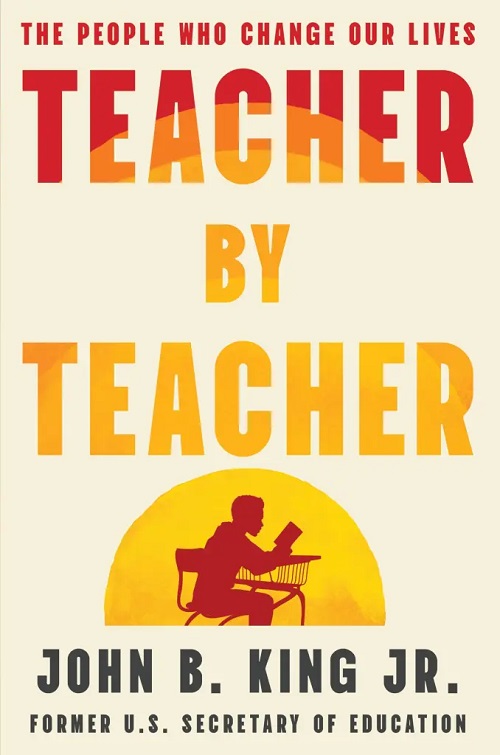
For John B. King Jr., former U.S. Secretary of Education, school wasn’t just a place—it was a lifeline. In his newly released memoir, Teacher By Teacher: The People Who Change Our Lives, King traces his journey from a grief-stricken child in New York to the corridors of educational leadership in Washington, D.C. But while the book is rooted in the American educational experience, its messages about the impact of teachers resonate far beyond U.S. borders.
In an exclusive interview with Education Week’s Sam Mallon on May 5, 2025, King reflected on his memoir, the teachers who shaped his life, and the ongoing challenges educators face worldwide.
A Childhood Saved by Teachers
King’s story is a testament to the power of mentorship. Following the death of his mother and his father’s battle with Alzheimer’s, school became King’s sanctuary. “Teachers saved my life,” he shared, recalling how educators believed in him, nurtured his potential, and gave him hope even when the world outside seemed dark.
From those formative years, King went on to earn degrees from Harvard, Columbia, and Yale. His career as a teacher, school principal, education policymaker, and eventually, U.S. Secretary of Education became a journey of giving back. The memoir celebrates not only King’s personal resilience but the quiet heroism of teachers everywhere.
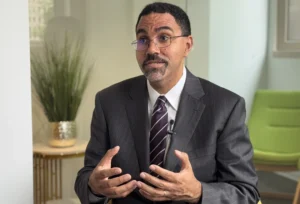
Former Secretary of U.S Education John King. Image Source- EducationWeek
While King’s book is anchored in American education, the messages it carries are universally relevant. Teachers worldwide are grappling with challenges—overcrowded classrooms, mental health issues among students, and ever-changing education policies. In his interview with Education Week, King highlighted how schools must be more than academic factories. They must be safe havens, places of healing, and hubs of inspiration.
King advocates for “trauma-informed practice”—an approach where teachers are equipped to understand and support students facing emotional challenges. This is a lesson that transcends borders, as schools globally encounter rising mental health concerns among students.
Teacher Evaluations and Policy Pressures
King’s time as U.S. Secretary of Education was marked by ambitious reforms—from implementing the Every Student Succeeds Act (ESSA) to pushing for more rigorous teacher evaluation systems. But looking back, he acknowledges a key lesson: change cannot be forced without teacher buy-in.
“Teachers can’t be bombarded with reforms,” he explained. Change must be gradual, and educators must feel a sense of ownership over new policies.
King’s narrative is ultimately about hope. In his memoir, he shares how a single teacher’s encouragement can change a student’s life trajectory. He recalls how his father’s legacy as New York’s first Black deputy schools chief was kept alive by a former student who, years later, shared how impactful his father’s teaching was.
Teaching is more than a job—it is a calling. It is a force for social good, a platform for mentorship, and a means to nurture the next generation of thinkers, leaders, and dreamers. King’s Teacher By Teacher is a reminder that educators everywhere have the power to transform lives, often without even knowing it.
Though written from an American perspective, Teacher By Teacher is a love letter to educators everywhere. It is a call to support teachers, to understand the pressures they face, and to recognise the life-changing impact they can have on their students.
For a world that often takes teachers for granted, John King’s memoir is a reminder of the heroes who stand at the front of every classroom, ready to make a difference.
Excerpts referenced in this article were taken from John King's exclusive interview with Education Week on May 5, 2025, in Washington, conducted by Sam Mallon for Education Week.
Education
Rewriting Ambedkar: Why Students Must Know the Man Beyond the Constitution
Published
3 months agoon
April 14, 2025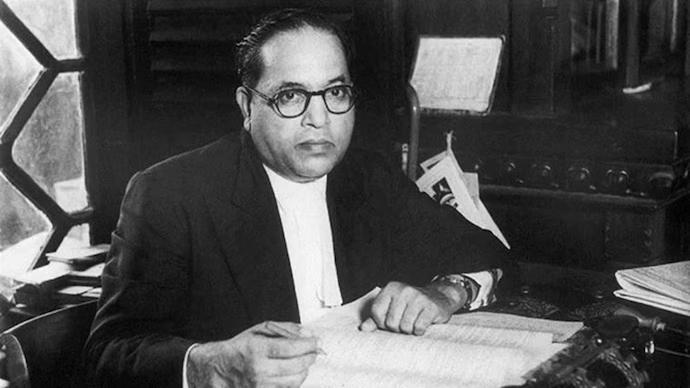
Ambedkar Jayanti Special | ScooNews
Dr. Bhimrao Ramji Ambedkar. Most students in India recognise the name—largely as the “Father of the Indian Constitution.” If you ask a Class 10 student what Ambedkar stood for, you’ll likely get a respectable summary: chairperson of the Drafting Committee, architect of constitutional equality, and perhaps a passing reference to his fight against untouchability. But that’s where it ends.
This is not a failure of our students. This is a failure of our books.
Because Babasaheb Ambedkar was not just a jurist or a political figure to be summarised in three bullet points under Civics. He was one of the most radical, intellectually fierce, and unapologetically liberal minds India has ever known. And if we are talking about modern India—its democracy, its dissent, its diversity, its demands for dignity—then Dr. Ambedkar isn’t just relevant, he is foundational.
And yet, he remains tragically under-read and under-taught.
The Man We Didn’t Read Enough About
Ambedkar’s life is a masterclass in resilience, intellect, and reform. Born into the most marginalised community in India, he went on to become the first Indian to pursue a doctorate in economics from Columbia University, studied law at the London School of Economics, and returned to a country that still wouldn’t allow him to sit beside upper-caste students.
But Ambedkar did not stop at personal success. He turned his education into ammunition. His writings dissected caste not just as a social issue but as an economic and psychological reality. In works like Annihilation of Caste, he boldly challenged not just the religious orthodoxy but also Mahatma Gandhi—a sacred figure for many—in ways that were considered almost blasphemous at the time. And even today.
Unlike Gandhi, who sought reform within the caste system, Ambedkar demanded its demolition. Where Gandhi appealed to morality, Ambedkar appealed to reason, law, and modernity.
This discomfort with Ambedkar’s sharp, unflinching views is perhaps why our textbooks package him safely—as the dignified lawyer with a pen, not the roaring revolutionary with a voice.
More Than a Constitution-Maker
To say Ambedkar gave us the Constitution is both true and painfully incomplete.
- He gave us the right to constitutional morality, the idea that the Constitution isn’t just a set of rules but a living document that must be interpreted in the spirit of liberty, equality, and justice.
- He envisioned reservations not as charity but as corrective justice.
- He believed that a true democracy must have “social democracy” at its base—not just the right to vote but the right to dignity in everyday life.
- And he warned, prophetically, that political democracy without social democracy would be India’s downfall. He was not just designing India’s governance system, but was rather trying to develop India’s moral spine.
A Voice for Individual Freedom—Louder Than We Knew
“I measure the progress of a community by the degree of progress which women have achieved.”- Bhim Rao Ambedkar
Ambedkar’s liberalism was far ahead of his time. He consistently advocated for individual rights in the truest sense. There’s documented evidence that he argued for the decriminalisation of same-sex relationships, seeing it as an issue of individual freedom long before such conversations entered our legal discourse.
His economic ideas—rarely taught—favoured state-led industrialisation, fair wages, and social security decades before these became policy buzzwords. His writings on women’s rights were equally progressive, particularly through the Hindu Code Bill, which sought to grant women equal property rights, rights to divorce, and freedom in marriage—a bill so radical for its time that it was shelved, only to return years later in diluted forms.
Why Today’s Students Need Ambedkar—Unfiltered
In an age where freedom of speech is contested, when marginalised voices still struggle for space, when gender and sexuality are still debated as ‘issues’ instead of identities—Ambedkar is the teacher we didn’t know we needed.
We need to stop sanitising him for our syllabus. We need high schoolers to read Annihilation of Caste in their literature classes and understand the intersections of caste, religion, and gender in history—not just from an upper-caste nationalist lens but from the view of the people who fought to be seen as human.
We need Ambedkar in economics classrooms, debating his views against today’s neoliberal models.
We need to introduce him as an intellectual, a radical thinker, a critic of Gandhi, a reformer of Hindu personal law, a journalist, a linguist, a labour rights advocate, a rebel with a cause.
Because the freedoms we enjoy today—freedom of religion, freedom of expression, freedom to love, to choose, to protest, to dream—all have Ambedkar’s fingerprints on them.
If our education system truly believes in nurturing critical thinkers and empathetic citizens, then Dr. Ambedkar cannot remain a footnote or a ceremonial portrait garlanded on April 14th.
He must be read. He must be debated. He must be understood. Because the more we know about Ambedkar, the more we know about ourselves—and the democracy we’re still trying to build.
Education
“Be the Change in a Changing World”: Anita Karwal and Anju Chazot Reflect on NEP 2020
Published
4 months agoon
March 27, 2025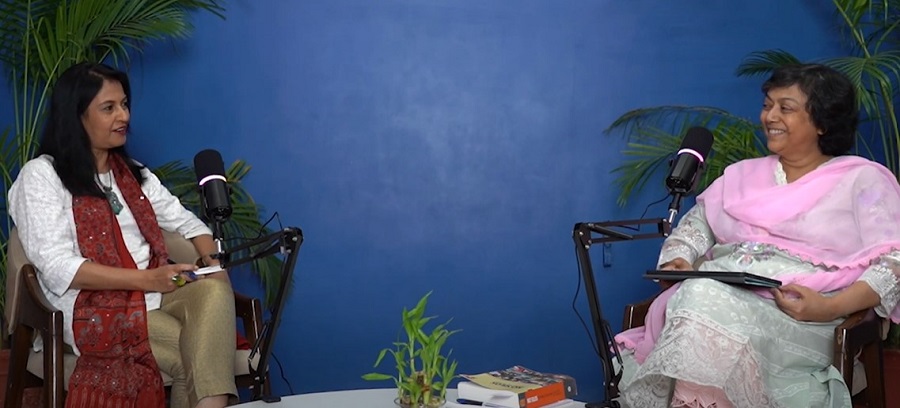
In a deeply reflective and engaging episode of the NEP Tunes podcast, Dr. Anju Chazot, education reformer and founder of Mahatma Gandhi International School (MGIS), Ahmedabad, sat down with Mrs. Anita Karwal, former Secretary of School Education, Government of India, to explore one fundamental question: How do we prepare children for a rapidly changing world?
Titled “Be the Change in the Changing World,” the episode offers a powerful conversation between two veterans of Indian education who have shared a decades-long friendship—and a mutual vision for a holistic and transformative school system.
“You can’t prepare children for tomorrow with the pedagogy of the day before yesterday.”
Drawing inspiration from John Dewey’s famous words, the episode begins by addressing the urgent need for policy literacy among stakeholders in education. Mrs. Karwal and Dr. Chazot underscore that the pace of global change—technological, environmental, economic, and emotional—has far outstripped the ability of traditional education systems to keep up. “We are in a VUCA world—volatile, uncertain, complex, ambiguous,” Karwal reminds listeners, calling for schools to adapt to this reality rather than resist it.
Decolonising the Classroom
A significant portion of the conversation focused on the historical context of schooling in India. Dr. Chazot draws parallels between today’s school system and Michel Foucault’s “cell and bell” model, which mirrors the prison system—marked by uniforms, bells, and rigid structures. Tracing the roots of modern schooling to the Prussian military model and colonial-era policies introduced by Lord Macaulay, both speakers lamented how education was once used as a tool to produce clerks for the Empire, rather than creative, entrepreneurial individuals.
“Colonialism didn’t just take away our resources; it colonised our minds,” Chazot observed. Karwal added, “The gurukul system was rooted, contextual, and sustainable. The colonial model replaced it with standardisation and control.”
Disruptions and the Call for Change
From climate change to AI, from the gig economy to rising mental health challenges—today’s youth are living in an era of non-stop disruptions. Mrs. Karwal shared a poignant insight: on the very day she retired from her government service (30 November 2022), OpenAI launched ChatGPT. “As a senior citizen, I would have felt useless had I not tried to understand this disruption,” she said, urging listeners to stay updated with technological trends.
Mental health also featured prominently in the discussion. The World Health Organization reports a 25% increase in global anxiety and depression cases, especially among the youth. Schools, Karwal said, must acknowledge and address this invisible epidemic, and create environments that are nurturing—not anxiety-inducing.
Why NEP 2020 Is a Game Changer
Against this backdrop, both educators believe the National Education Policy 2020 is a timely and visionary document. “It’s not just about academics—it’s about the whole child,” said Chazot, pointing to NEP’s focus on holistic development across cognitive, emotional, physical, and ethical domains.
Key elements of the NEP and the newly released National Curriculum Framework (NCF) discussed in the podcast include:
-
A shift from rote learning to competency-based, experiential learning
-
Focus on Indian traditions and cultural rootedness
-
Moving away from exam-centric teaching, especially in early years
-
Recognition of multilingualism and contextual learning
-
Encouragement of critical thinking, creativity, and adaptability
“Learning to learn is the most essential skill of the future,” Karwal stressed. “Children must be ready to unlearn and relearn throughout life.”
The Future of Jobs
To illustrate the rapidly changing employment landscape, both speakers listed a host of emerging careers—from Prompt Engineers and Drone Fleet Managers to Climate Data Analysts and Digital Detox Specialists. “Just imagine,” Chazot quipped, “if I were a child again, I’d become a Prompt Engineer and finally fulfil my parents’ dreams of being an engineer—with a creative twist!”
Karwal, on the other hand, expressed a desire to become a Human-Machine Team Manager—a futuristic role bridging collaboration between people and machines.
Their message was clear: the world our children are entering is drastically different from the one their parents and teachers grew up in. And education must keep up.
A Takeaway Challenge for Listeners
To wrap up the episode, the hosts offered a unique call-to-action: ask yourself what job you would pick today if you could go back in time again. Then, explore new professions with your family or students. From LinkedIn job listings to the World Economic Forum’s reports, Karwal recommended several tools to research emerging careers. They invited listeners to write in with their findings and reflections.
“This exercise is not just for students,” said Dr. Chazot. “It’s for parents, teachers, and policy-makers alike. We must all become learners again.”
Final Thoughts
In an era where the only constant is change, the NEP Tunes podcast is a timely resource to help educators, parents, and students reimagine the purpose of schooling. With leaders like Anju Chazot and Anita Karwal at the helm of the conversation, the journey towards meaningful transformation in Indian education seems not only possible—but exciting.
🟡 This article is adapted from the NEP Tunes podcast hosted by Dr. Anju Chazot. You can listen to the full episode on YouTube. Here is the video-
Education
Sunbeam Indiranagar Shines in Academics, Arts, and Sports, Cementing Its Legacy of Holistic Education
Published
4 months agoon
March 18, 2025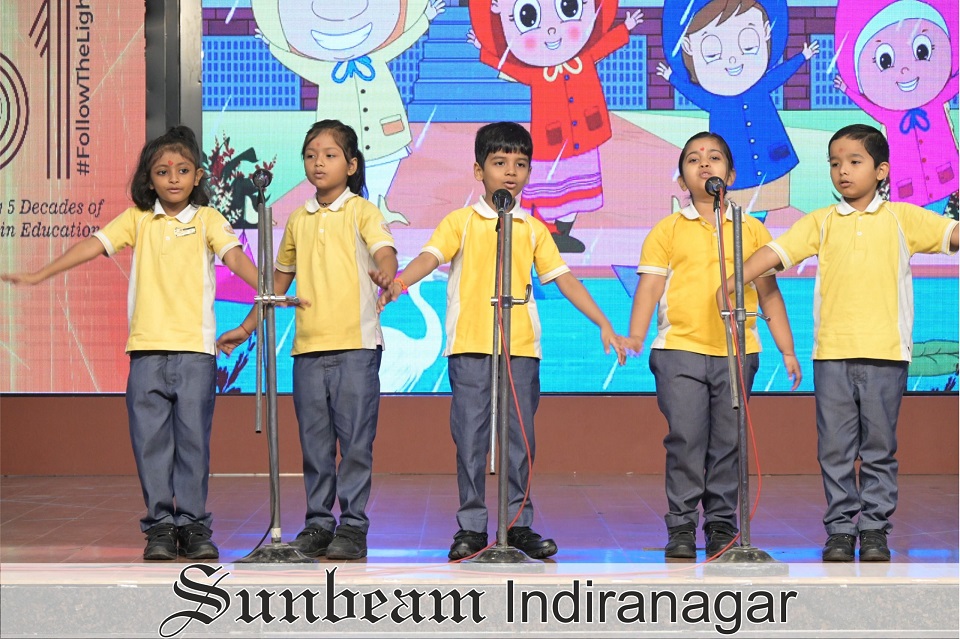
Varanasi: Sunbeam Indiranagar, Varanasi, has emerged as a dynamic centre for academic excellence, cultural enrichment, and sporting achievements, reinforcing its commitment to holistic education. In a year marked by significant accomplishments, students and faculty have demonstrated a dedication to intellectual growth, creative expression, and leadership development, embodying the rich legacy of the Sunbeam Group.
The school’s approach extends beyond traditional academics, encouraging students to engage in parallel activities that nurture a well-rounded skill set. From literature festivals to classical dance championships, Sunbeam Indiranagar has provided students with platforms to explore, innovate, and excel.
Students had the opportunity to engage with global thought leaders through their participation in prestigious events such as the Jaipur Literature Festival and the Great Indian Learning Festival (GILF) at Daly College, organised by ScooNews. These experiences enabled them to explore contemporary literary and intellectual discussions, sharpening their analytical and creative abilities.
The performing arts department also made a mark with theatrical performances at Banaras Hindu University (BHU) and the Krishnamurti Foundation, under the guidance of renowned dramaturgist Mukherjee P.. The school’s commitment to developing critical thinking and communication skills was further reflected in students’ achievements in quizzes, creative writing, Olympiads, debates, and visual arts competitions, underscoring a culture of academic inquiry and artistic exploration.
Sunbeam Indiranagar’s focus on all-round development was evident in the State Level Kathak Championship, where students showcased their prowess in Indian classical dance. The school’s sporting achievements were equally impressive, with students excelling in the East Zone Skating Championship 2024 and the Open District Roller Championship 2024, securing both individual and team accolades. The school’s impact extends beyond student achievements, with its leadership being recognised for their visionary contributions to education. The Principal of Sunbeam Indiranagar was honoured with the Distinguished Educator for Future-Ready Skills award, securing All India Rank (AIR) 6 in the School Leader’s category by CENTA and receiving the Nari Shakti Sammaan for contributions towards empowering students through progressive learning methodologies.
Sunbeam Indiranagar’s standing as a leading educational institution was reaffirmed when it was ranked 5th among the Best Co-Ed Day Schools in Varanasi.
With its continued emphasis on holistic development, Sunbeam Indiranagar remains dedicated to shaping young minds, reinforcing its reputation as an institution that values learning in all its forms.
Education
Nagaland Schools Launch ‘Adolescent Girls Club’ to Empower Young Girls Under Mission Shakti
Published
4 months agoon
February 27, 2025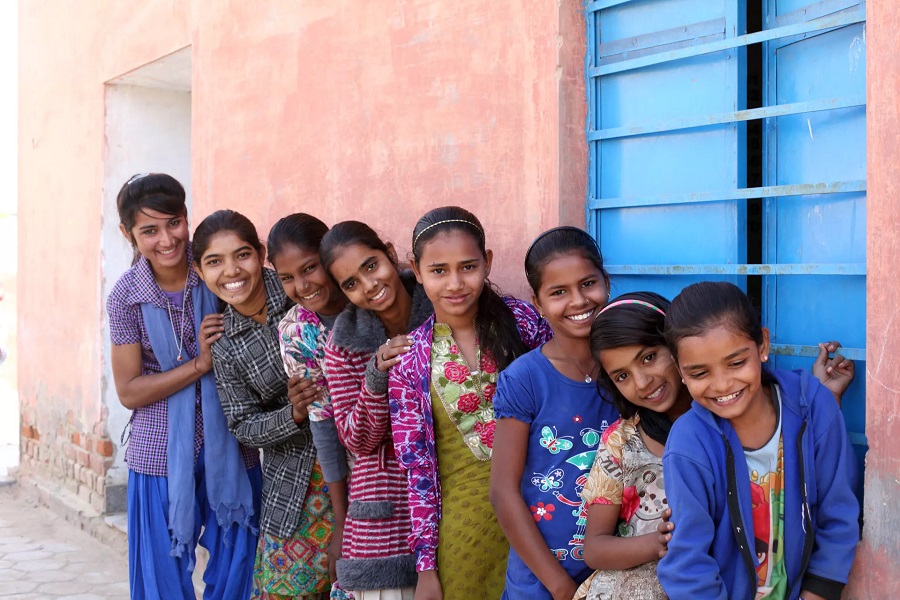
Adolescence is a pivotal phase in a child’s development, marked by rapid physical and psychological transformations. It is a time of exploration, self-discovery, and, often, vulnerability. To provide structured guidance and empower young girls during this crucial stage, Nagaland has introduced ‘Adolescent Girls Clubs’ in both government and private schools for girls aged 10-19 years under Mission Shakti.
On 5th October 2024, the first Adolescent Girls Club was launched at Don Bosco Higher Secondary School, Wokha, Nagaland, with 50 adolescent girls as its founding members. The initiative aims to equip girls with essential skills, knowledge, and support systems to navigate challenges, make informed choices, and build a strong foundation for their future. With the motto “Live the Promise,” the clubs aspire to develop confident, informed, and compassionate leaders of tomorrow.
The initiative is designed with key objectives to educate, uplift, and empower adolescent girls:
The Adolescent Girls Club will engage its members in workshops, mentorship programmes, health camps, community service projects, and creative expression activities. Additionally, a special adolescent toolkit is being developed to serve as a guide for both adolescent girls and their parents. The toolkit will include informational materials on menstrual hygiene management (MHH), mental health, teenage pregnancy prevention, child abuse awareness, and emergency helpline numbers.
Teachers and counsellors are actively working on IEC (Information, Education, and Communication) materials tailored to adolescent needs. The clubs will also conduct monthly activities to ensure continuous engagement, provide a platform for girls to discuss their concerns, and create a safe space for their growth and development.
This initiative under Mission Shakti is expected to positively impact thousands of young girls across Nagaland, equipping them with the necessary tools to navigate adolescence with confidence and resilience.Objectives of the Adolescent Girls Club
Education
Saudi Teacher Mansour bin Abdullah Al-Mansour Wins $1 Million Global Teacher Prize
Published
5 months agoon
February 13, 2025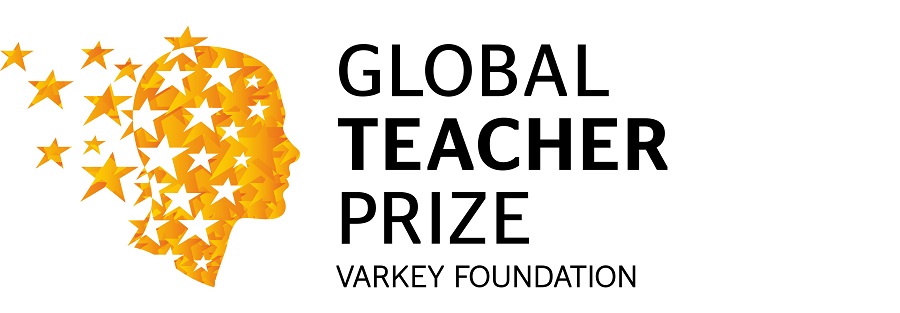
In a heartwarming recognition of dedication and innovation in education, Saudi Arabian teacher Mansour bin Abdullah Al-Mansour has been awarded the prestigious $1 million GEMS Education Global Teacher Prize. Announced at the World Governments Summit in Dubai, the award celebrates Al-Mansour’s transformative work in empowering students from low-income families, including hundreds of gifted orphans, and his 3,000+ hours of community service.
Al-Mansour, a teacher at Prince Saud bin Jalawi School in Al-Ahsa, has spent over two decades uplifting students facing academic challenges, disabilities, and financial hardships. His efforts include establishing mentorship programmes, innovation incubators, and financial literacy initiatives, enabling students to achieve global recognition. Notably, he plans to use the prize money to build a school for talented orphans, furthering his mission to provide quality education to underprivileged children.

(Image: Mansour Al Mansour- 2025 Global Teacher Prize Winner)
Beyond the classroom, Al-Mansour has authored 21 educational books, trained over 300 educators, and led literacy programmes for prison inmates, helping reduce sentences for some. His work has earned him accolades as an international ambassador for educational excellence.
The Global Teacher Prize, now in its ninth year, recognises exceptional educators who make a profound impact on their communities. Al-Mansour was selected from over 5,000 nominations across 89 countries, joining a prestigious list of global educators.
Sunny Varkey, Founder of the Global Teacher Prize, praised Al-Mansour’s “passion, dedication, and the life-changing power of education.” Stefania Giannini, UNESCO Assistant Director-General for Education, highlighted the importance of investing in teachers to build a sustainable future.
As the world faces challenges like inequality and climate change, Al-Mansour’s story serves as a beacon of hope, reminding us of the transformative power of education and the unsung heroes shaping our future.
Newsletter

Less Than Half of Indian Schools Offer Skill-Based Courses for Senior Students: NCERT Survey

The Woman Who Refused to Disappear – Aditi Sharma’s Quiet Fight for Education

A Vision Beyond Sight – How Aarti Takawane is Rewriting Futures for Blind Girls

UP Govt Launches Astro Labs in Government Schools to Boost Scientific Learning

Class 3 Learning Levels Show Gains Since Pandemic, But Still Below 2017: PARAKH Survey

Design and the Future of Learning: How Architecture is Shaping Next-Gen Schools

Punjab to Introduce Business, Marketing Education in Govt Schools for High Schoolers

Manipur Rallies Call for Disruption-Free Education Amid Ongoing Unrest

Tripura CM Launches School Framework, Stresses Social Work in Education

“We Sleep on Walls Here”: Shubhanshu Shukla Talks to Indian Students from Space

A Structural Proposal to Transform School Education in Bihar

NIIT Foundation and YuWaah, UNICEF Launch Free Online Digital Marketing Course for Youth

National Conference Pushes for Common Standards Across School Boards

Maharashtra: Over 8,000 Villages Lack Schools, CCTV Compliance Still Patchy

Haryana to Offer Free After-School Coaching for JEE, NDA Aspirants

Telangana CM Calls for Overhaul of Intermediate Education in Telangana

Indian Astronaut Shubhanshu Shukla to Connect with School Students Live from Space

Are 4-Year Degrees Dead? Nikhil Kamath and the WEF Say Lifelong Learning Is Here to Stay

UGC Cracks Down on 89 Institutes Over Anti-Ragging Failures

Government Doubles Down on Coaching Centres: New Panel Signals Stronger Regulation Ahead

CBSE To Conduct Board Exams Twice for Class 10 from 2026

How to Win Back Wandering Minds: Post-Summer Edition
Tripura Becomes Third Indian State to Achieve Full Literacy

Assam Brings Sign Language to Senior Secondary Classrooms in Landmark Move

Delhi Schools to Implement Age 6 Rule for Class 1 Admissions from 2026

Is Your School Following These Mandatory CBSE Committees?

CBSE’s ‘Sugar Boards’ Initiative: Tackling the Sweet Crisis in Indian Schools

Maharashtra to Regulate Pre-Primary Education with New Law Aligned to NEP 2020

MAHAJYOTI’s Book Distribution Scheme to Empower 7,000 OBC Students Preparing for JEE/NEET & MHT-CET

China Embarks on Ambitious AI-Driven Education Reform to Build a ‘Strong Education Nation’ by 2035

John King’s Book ‘Teacher By Teacher’: A Global Tribute to the Transformative Power of Education

CBSE Introduces Mandatory Bridge Course for Classes 6 to 12 in Chhattisgarh Under NEP 2020

Rewriting Ambedkar: Why Students Must Know the Man Beyond the Constitution

CBSE Mandates 50-Hour Annual Training for Teachers, Declares STEM as 2025 Theme

Banu Mushtaq’s International Booker Win Is a Wake-Up Call for Indian Schools to Reclaim Literature

India Bids Farewell to NEP Architect Dr K. Kasturirangan

Pradhan Mantri Rashtriya Bal Puraskar 2025: Nominations Now Open for India’s Young Achievers

NCERT Class 7 Textbooks Updated: Mughals Removed, Focus on Indian Ethos and Pilgrimage

Delhi Government Cracks Down on Dummy Schooling; Over 600 Schools Inspected, 10 Issued Notices

Delhi Approves Landmark Bill to Regulate School Fees Across 1,677 Institutions

Operation Sindoor and Operation Abhyaas: Navigating School Safety and Student Well-being Amid Rising Tensions

Harvard Stands Its Ground: Harvard Faces ₹18,400 Crore Funding Freeze After Rejecting Trump Administration’s Demands

CUET-UG 2025 Likely to be Postponed, Fresh Dates Expected Soon

Aalamaram 2025: Where Indian Educators Came Together to Grow, Reflect, and Lead

Trump Signs Executive Order to Promote AI Integration in U.S. K-12 Education

Mizoram Declared First Fully Literate State in India

Indian Students Flock to Singapore, Ireland, and Dubai for Higher Studies: 38% Surge Recorded

OpenAI Academy Launches in India to Democratise AI Education for Students, Teachers, and Startups

UK’s New Immigration Rules: What They Mean for Indian Students

Private School Fees Surge by 50–80% in Three Years, National Survey Finds
SGEF2023 | Special Address by Rama Datt, Trustee, Maharaja Sawai Man Singh II Trust, Jaipur

ScooNews | After Movie | ScooNews Global Educators Fest 2023

Aftermovie | NIES2 UP Chapter | 21 Jan 2023

WEBINAR | Gamification in Education: How Digital Badges Can Boost Student Motivation and Engagement

ScooNews | WEBINAR| Importance of Physical Activity for Children at School | Plaeto

SCOONEWS | WEBINAR | WHY DIGITIZING YOUR SCHOOL IS A MUST | TEACHMINT

Keynote Address | Lakshyaraj Singh Mewar

Anurag Tripathi, Secretary, CBSE at SGEF2022

How schools can nurture every student’s genius

Aftermovie | SGEF2022 | Jaipur

Li Andersson | Minister of Education | Finland

Anurag Tripathi, Secretary, Central Board of Secondary Education (CBSE) discusses NEP2020

ScooNews | Early Ed Asia 2019 | Aftermovie
#PodarECEconf : Pursuing quality ECE

#CBSE Class XII #Results #Highlights

The interesting story of India’s educational system | Adhitya Iyer

A young scientist’s quest for clean water

The Danger of Silence: Clint Smith

National Digital Library of India is an initiative by HRD Ministry

Remembering Kalpana Chawla on her birthday!

Message from Sadhguru for Students!
Message from Sadhguru for Students!

The Untapped Genius That Could Change Science for the Better

Eddy Zhong: How school makes kids less intelligent TEDxYouth@Beacon

#TEDxCanberra : What if every child had access to music education…
Trending
-
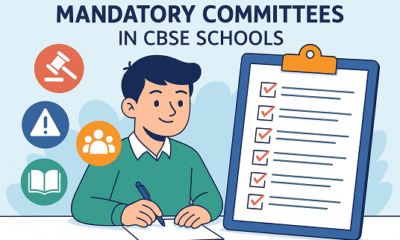
 Education3 months ago
Education3 months agoIs Your School Following These Mandatory CBSE Committees?
-

 Education2 months ago
Education2 months agoCBSE’s ‘Sugar Boards’ Initiative: Tackling the Sweet Crisis in Indian Schools
-
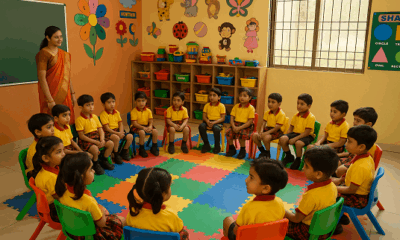
 Education3 months ago
Education3 months agoMaharashtra to Regulate Pre-Primary Education with New Law Aligned to NEP 2020
-
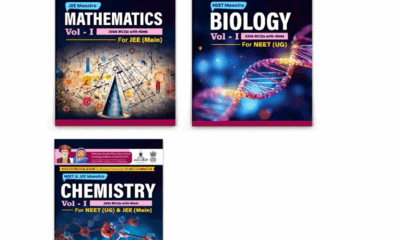
 Education3 months ago
Education3 months agoMAHAJYOTI’s Book Distribution Scheme to Empower 7,000 OBC Students Preparing for JEE/NEET & MHT-CET
-
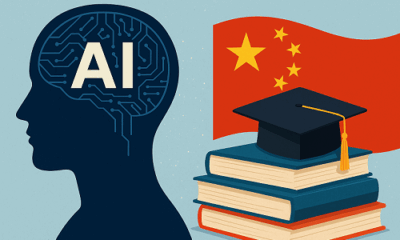
 Education3 months ago
Education3 months agoChina Embarks on Ambitious AI-Driven Education Reform to Build a ‘Strong Education Nation’ by 2035
-
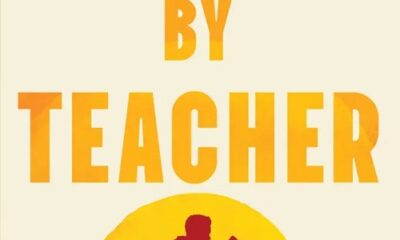
 Education2 months ago
Education2 months agoJohn King’s Book ‘Teacher By Teacher’: A Global Tribute to the Transformative Power of Education
-
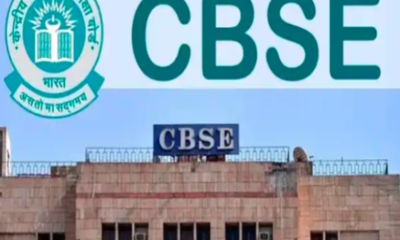
 Education3 months ago
Education3 months agoCBSE Introduces Mandatory Bridge Course for Classes 6 to 12 in Chhattisgarh Under NEP 2020
-
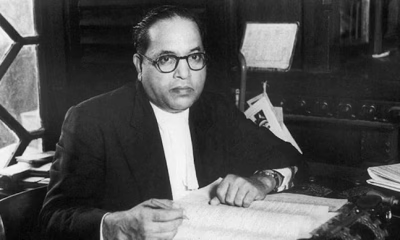
 Education3 months ago
Education3 months agoRewriting Ambedkar: Why Students Must Know the Man Beyond the Constitution
-
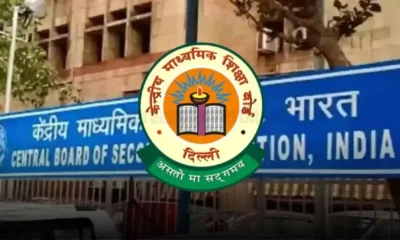
 Education3 months ago
Education3 months agoCBSE Mandates 50-Hour Annual Training for Teachers, Declares STEM as 2025 Theme
-
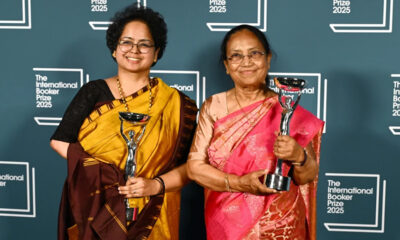
 Education2 months ago
Education2 months agoBanu Mushtaq’s International Booker Win Is a Wake-Up Call for Indian Schools to Reclaim Literature




